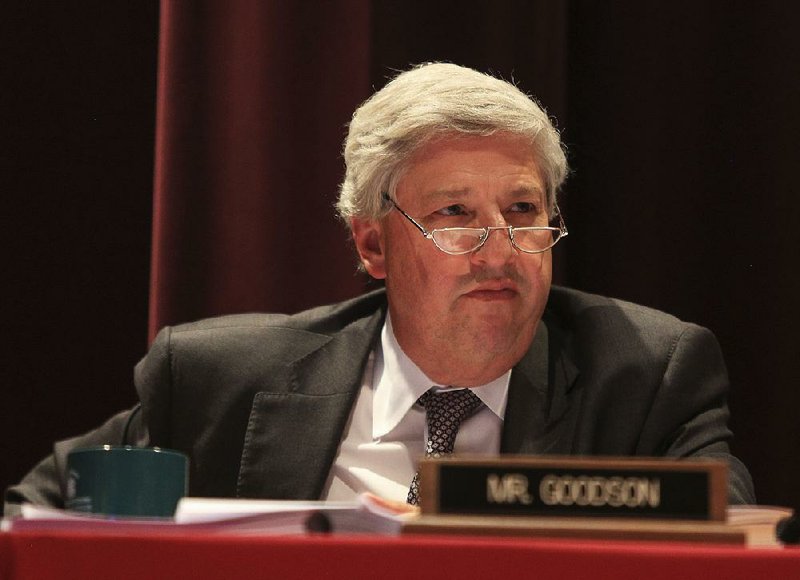A federal judge in Fort Smith was wrong in deciding University of Arkansas System Trustee John Goodson and 14 other class-action plaintiff and defense lawyers acted improperly when they removed a case from federal court to settle it in state court on more favorable terms, an 8th U.S. Circuit Court of Appeals panel ruled Tuesday.
The lawyers' actions are permitted under federal court rules, according to an opinion written by the circuit's Chief Judge Lavenski Smith.
U.S. District Judge P.K. Holmes III erred in deciding last year that the lawyers abused the judicial process and violated federal court rules regarding dismissal of cases, the appeals panel said.
Holmes also was wrong to impose reprimands on five of the lawyers.
In reversing Holmes' decision, the St. Louis appeals court sent the case back to federal court in Fort Smith for further proceedings.
"The district court's frustration with what it perceived as an abuse of the federal court system and lack of candor with the court is understandable," the opinion said. But the lawyers "did not violate" court rules in removing a class-action complaint against an insurance company from Holmes' federal district court without his knowledge for settlement in state court.
The attorneys also had a plausible legal argument that the district court's approval wasn't required, the opinion said.
Attorneys for the lawyers declined to comment or did not return emails and calls Tuesday. Holmes' office doesn't comment on his rulings.
The 8th Circuit decision should result in lifting Holmes' reprimands of Goodson and law partner Matt Keil of Texarkana, Jason Roselius of Oklahoma City, and Richard Norman and Martin Weber Jr. of Houston. They were among plaintiffs' lawyers in Adams v. United Services Automobile Association (2:14-cv-2013).
The appeals court decision also justifies the actions of other lawyers in the Adams case whom Holmes criticized but didn't reprimand. Those plaintiffs' attorneys were Casey Castleberry and Tom Thompson of Batesville; Timothy Myers, William Putnam, W.H. Taylor and Steven Vowell of Fayetteville; and Matthew Mustokoff of Radnor, Pa.
All 12 have worked together suing large companies through class-action cases. Goodson is known in Arkansas for winning millions in class-action settlements and as a large donor to political campaigns. He is married to Arkansas Supreme Court Justice Courtney Goodson.
The defense attorneys vindicated in the appeal are Lyn Pruitt of Little Rock and Wystan Ackerman and Stephen Goldman of Hartford, Conn.
All of the lawyers worked on Adams v. USAA in Holmes' courtroom. The class action involved a group of claims holders suing the insurance company for underpayment.
Lawyers on both sides agreed in June 2015, after 17 months of litigation, to move the class action from Holmes' federal court to Polk County Circuit Court for settlement.
When Holmes learned of the switch through an article in Arkansas Business newspaper, he ordered the lawyers to show why they shouldn't be sanctioned for improper conduct.
The judge said he wouldn't have approved the state court settlement and that it benefited the lawyers and the insurance company at the expense of policyholders who were harmed.
Plaintiffs' lawyers received $1.85 million in fees and expenses in the Adams case, court records show. Only 4 percent of eligible policyholders filled out a lengthy form to claim part of the insurance company's estimated $3.44 million settlement pool.
Holmes' reprimand of the five attorneys in August said they acted in "bad faith," or with previous knowledge that what they did was improper.
The other seven plaintiffs' lawyers took similar actions in the Adams case but didn't exhibit bad faith, Holmes wrote. The judge didn't reprimand or punish them.
Attorneys for the plaintiffs' lawyers said in their appeal that Holmes was wrong on all counts.
In a 26-page opinion Tuesday, the three-judge panel agreed.
The appellate panel said Holmes cited precedents under one rule for dismissal, 41(a)(2), which the judges said applied to contested dismissals.
But the panel applied a different rule, 41(a)(1), for dismissals in which all parties agree. That rule requires "no judicial approval or review as a prerequisite to dismissal; in fact, the dismissal is effective upon filing, with no court action required."
"The reason for the dismissal is irrelevant," the opinion continued.
"The appeals court correctly recognized the district court's 'understandable frustration' with the tactics used here," said an email from Ted Frank, a Washington lawyer known for criticizing class-action settlements he claims are unfair.
Frank filed a brief in the 8th Circuit appeal in support of Holmes' rulings.
After Tuesday's opinion, Frank wrote, "District courts can and should avoid the problem in the future by creating a standing order at the beginning of a case requiring court approval for a dismissal or compromise of an uncertified class action."
The 8th Circuit's decision saying the Fort Smith court "abused its discretion" when it wrongly found the lawyers at fault "doesn't mean the judge did anything improper or illegal," said Joshua Silverstein, a professor at the William H. Bowen School of Law in Little Rock.
"It's a technical legal term. It just means the judge got it dead wrong."
A Section on 07/26/2017
